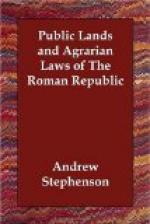Thus in the city, plebeians found no employment. Competition was impossible between fathers of families and slaves who labored en masse in the vast work-shops of their masters, with no return save the scantiest subsistence, no families, no cares, and most of all no army service. In the country it was still worse. It would appear that none but slaves were employed in the cultivation of the land. Doubtless the number of slaves in Italy has been greatly exaggerated, but it is certain that the substitution of slave labor for free, was an old fact when Licinius[1] attempted by the formal disposition of his law to check the evil. In the first centuries of Rome, slaves must have been scarce. They were still dear in the time of Cato, and even Plutarch mentions as a proof of the avarice of the illustrious[2] censor, that he never paid more than 15,000 drachmae for a slave. After the great conquests of the Romans, in Corsica, Sardinia, Spain, Greece, and the Orient, the market went down by reason of the multitude of human beings thrown upon it. An able-bodied, unlettered man could be bought for the price of an ox. Such were the men of Spain, Thrace, and Sardinia. Educated slaves from Greece and the East brought a higher price. We learn from Horace, that his slave Davus whom he has rendered so celebrated, cost him 500 drachmae.[3] Diodorus of Siculus says that the rich caused their slaves to live by their own exertions. According to him the knights employed great bands of slaves in Sicily, both for agricultural purposes and for herding stock, but they furnished them with so little food that they must either starve or live by brigandage. The governors of the island did not dare to punish these slaves for fear of the powerful order which owned them.[4] Slave labor was thus adopted for economic reasons, and, for the same reasons, agriculture in Italy was abandoned for stock raising.
Says Varro:[5] “Fathers of families rather delight in circuses and theatres than in farming and grape culture. Therefore, we pay that wheat necessary for our subsistence be imported from Africa and Sardinia; we pick our grapes in the isles of Cos and Chios. In this land where our fathers who founded Rome instructed their children in agriculture, we see the descendants of those skillful cultivators, by reason of avarice and in contempt of laws, transferring arable lands into pasture fields, perhaps ignorant of the fact that agriculture and fatherland were one.”
Fewer men were needed for the care of these pasture lands; but the evil did not stop here. Little by little these pasture lands were transformed into mere pleasure grounds attached to villas. This had already begun to take place as early as the second Punic war, when the plains of Sinuessa[6] and Falernia were cultivated rather for pleasure than the necessaries of life; so that the army of Fabius could find nothing upon which to sustain itself. Under these influences the plebeians, in 133, had become merely a turbulent,




